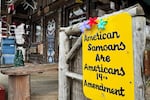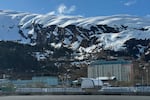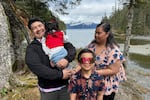The unique situation of American Samoans has caused confusion across several U.S. states, including Oregon, where officials inadvertently registered nearly 200 American Samoan residents to vote when they obtained driver’s licenses under the state’s motor-voter law.
Of those, 10 cast ballots in an election, according to the Oregon Secretary of State’s office. Officials there determined the residents had not intended to break the law and no crime was committed.
“We pay taxes, we do exactly the same as everybody else that are U.S. citizens,” said Tupe Smith, an American Samoan charged in a similar case in Alaska. “It would be nice for us to have the same rights as everybody here in the states.”
The situation in Oregon reflects broader national confusion stemming from the legal classification of American Samoans as U.S. nationals rather than U.S. citizens — the only U.S. territory whose people are not granted birthright citizenship.

A sign supporting citizenship for American Samoans is posted outside the Log Cabin Gifts store on the waterfront in Whittier, Alaska, May 13, 2025.
Mark Thiessen / AP
American Samoans are entitled to U.S. passports and can serve in the military. Men must register for the Selective Service. They can vote in local elections in American Samoa but cannot hold public office in the U.S. or participate in most U.S. elections.
The legal and cultural questions around this status also resonate within Oregon’s American Samoan community.
Siniva Bennett, board chair of the Samoa Pacific Development Corporation, a Portland-based nonprofit, explained why many in the territory have grown wary of birthright citizenship.
“We’ve been able to maintain our culture, and we haven’t been divested from our land like a lot of other indigenous people in the U.S.,” Bennett said, referring to the potential threat to communal land ownership laws if citizenship were imposed.
Related: Trump administration challenges Oregon over voter rolls in lawsuit
Although supporters of automatic citizenship say it would benefit the estimated 150,000 to 160,000 American Samoan nationals living in states such as California, Hawaii, Washington, Oregon, Utah and Alaska, others worry about unintended consequences. The debate reflects a broader tension between equal rights and cultural preservation.
In Alaska, confusion leads to criminal charges
The legal ambiguity continues to surface in unexpected places, like Whittier, Alaska, a cruise-ship stop squeezed between glacier-packed mountains and Prince William Sound. It’s so small that nearly all of its 260 residents live in the same 14-story condo building — yet it became the unlikely setting of an unprecedented noncitizen voter fraud case.

The 14-story Begich Tower is seen in Whittier, Alaska, May 13, 2025. A majority of the town's residents live in the condo.
Mark Thiessen / AP
Alaska prosecutors are pursuing felony charges against 11 residents of Whittier, most of them related to one another, saying they falsely claimed U.S. citizenship when registering or trying to vote. The defendants, all born in American Samoa, say they believed they were eligible.
“To me, I’m an American. I was born an American on U.S. soil,” said firefighter Michael Pese, one of those charged in Whittier. “American Samoa has been U.S. soil, U.S. jurisdiction, for 125 years. According to the supreme law of the land, that’s my birthright.”
The case began in 2023 when Pese’s wife, Tupe Smith, ran unopposed for a local school board seat. After winning with about 95% of the vote, she was arrested and charged.
Related: Oregon elections officials refer cases of possible noncitizen voting to state DOJ
She explained to officers that she knew she wasn’t allowed to vote in U.S. presidential elections, but thought she could vote in local or state races. She said she checked a box affirming that she was a U.S. citizen at the instruction of elections workers because there was no option to identify herself as a U.S. national, court records say.
“When they put me in cuffs, my son started crying,” Smith told The Associated Press. ”He told their dad that he don’t want the cops to take me or to lock me up.”
Later, Pese and eight relatives — along with one man from their village in American Samoa — were also charged. Advocates say they were targeted despite a lack of criminal intent.
“There is no question that Ms. Smith lacked an intent to mislead or deceive a public official in order to vote unlawfully when she checked ‘U.S. citizen’ on voter registration materials,” Neil Weare, one of Smith’s attorneys and co-founder of the Washington-based Right to Democracy Project, wrote in a brief to the Alaska Court of Appeals last week, after a lower court judge declined to dismiss the charges.

Michael Pese and his wife, Tupe Smith, pose for a photo with their son Maximus and daughter Cataleya in Whittier, Alaska, May 13, 2025.
Mark Thiessen / AP
Critics argue the prosecutions are politically motivated amid false claims from President Donald Trump and others that noncitizen voter fraud is widespread. Even state-level investigations have found voting by noncitizens to be exceptionally rare.
In Hawaii, American Samoans have faced similar confusion.
Sai Timoteo, who was born in American Samoa, ran for the state Legislature in 2018 before learning she wasn’t allowed to hold public office or vote. She had always considered it her civic duty to vote, and the form on the voting materials had one box to check: “U.S. Citizen/U.S. National.”
“I checked that box my entire life,” she said.
She also avoided charges, and Hawaii subsequently changed its form to make it more clear.
Related: A simple truth is at the root of many false election claims: Voter rolls are imperfect
In Alaska, the confusion reached such a level that the Pacific Community of Alaska reached out to the Alaska Division of Elections in 2021 and 2022 to ask whether American Samoans could vote in state and local elections.
Neither time did it receive a direct answer, said Tafilisaunoa Toleafoa with the organization.
“It is my hope that this is a lesson learned, that the state of Alaska agrees that this could be something that we can administratively correct,” Toleafoa said. “I would say that the state could have done that instead of prosecuting community members.”
Legacy of colonialism and exclusion
The root of the issue stretches back to the colonial legacy of American Samoa.
In the 19th century, the U.S. secured part of the Samoan archipelago as a naval refueling station. Over time, Puerto Rico, Guam, the U.S. Virgin Islands and the Northern Mariana Islands gained birthright citizenship — but American Samoa did not.

FILE - A sailing ship is seen in the harbor at Pago Pago, American Samoa, in July 2002.
David Briscoe / AP
Congress considered it for American Samoa in the 1930s, but declined. Some lawmakers cited financial concerns during the Great Depression while others expressed patently racist objections, according to a 2020 article in the American Journal of Legal History.
In 2021, the 10th U.S. Circuit Court of Appeals declined to extend automatic citizenship to those born in American Samoa, saying it would be wrong to force citizenship on those who don’t want it. The Supreme Court declined to review the decision.
Several jurisdictions across the country, including San Francisco and the District of Columbia, allow people who are not citizens to vote in certain local elections.
___
Bohrer reported from Juneau, Alaska, and Johnson from Seattle. Claire Rush in Portland, Oregon, and Jennifer Sinco Kelleher in Honolulu contributed to this report.



